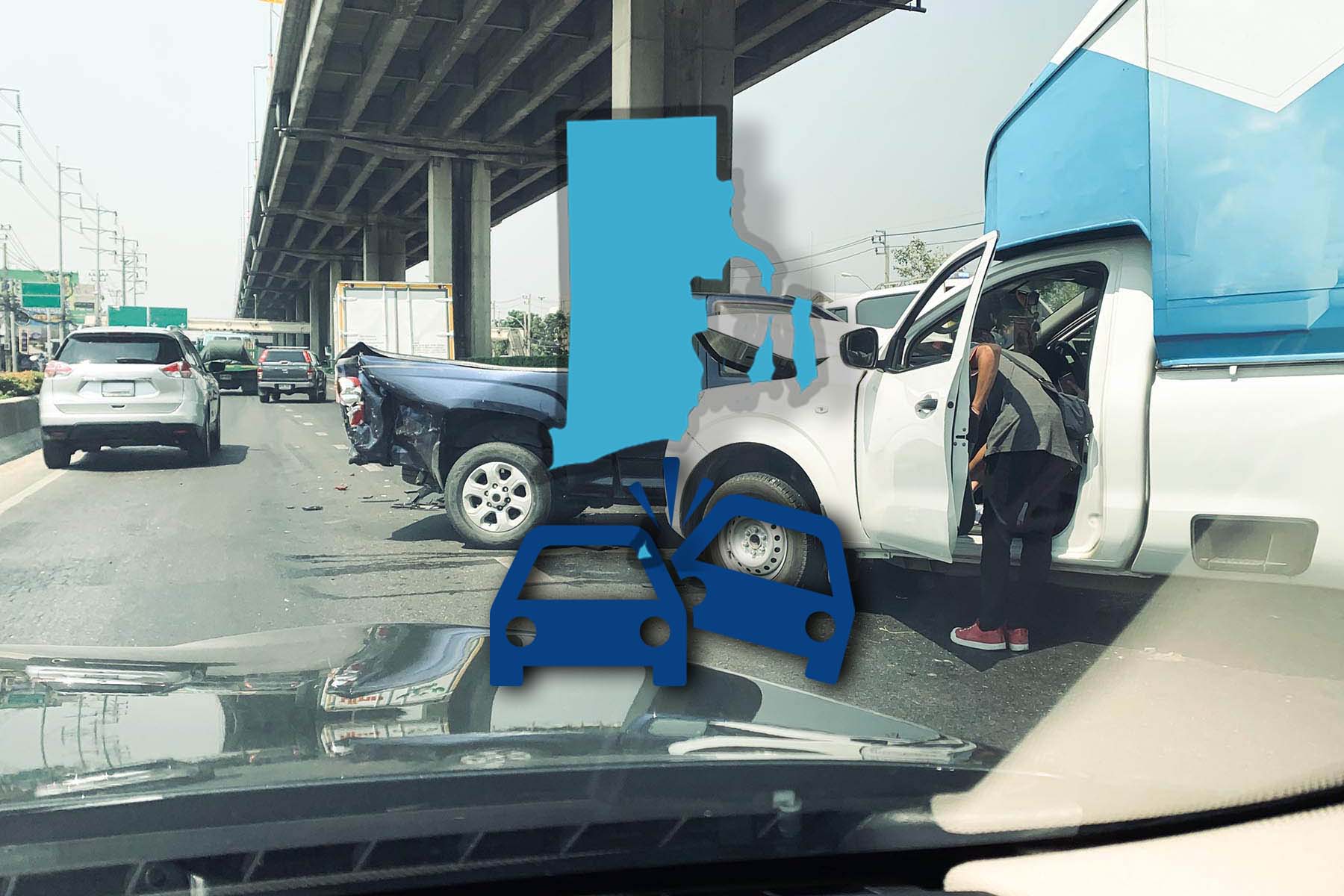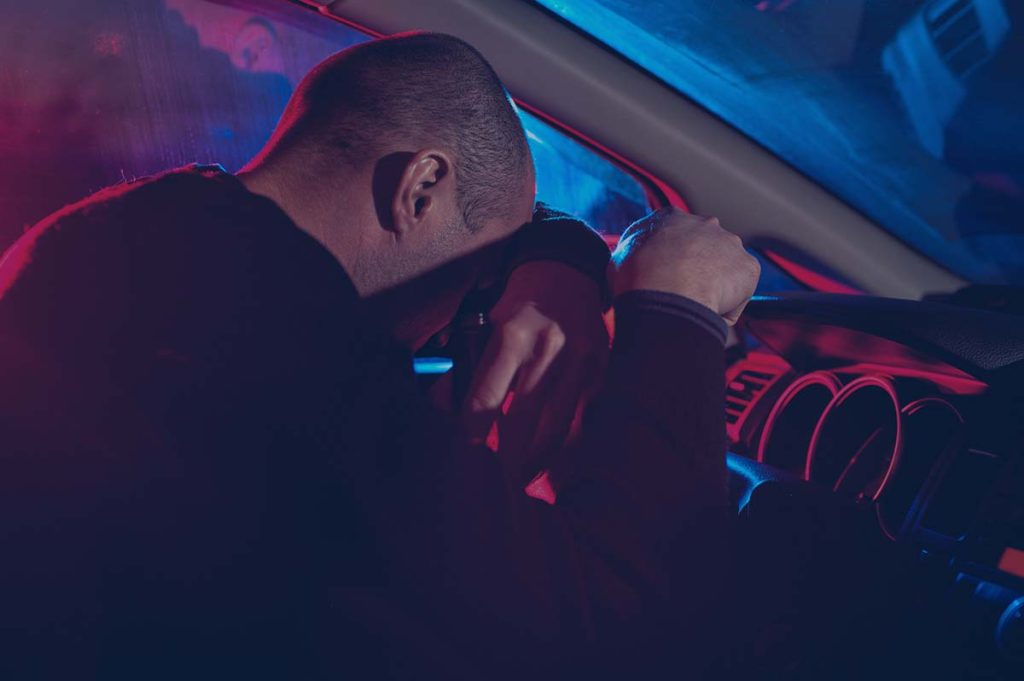
Rhode Island Hit and Run Laws: What happens if someone leaves the scene of an accident?
- Rhode Island Hit and Run Laws: What happens if someone leaves the scene of an accident?
- Rhode Island hit and run laws section 31-26-1 through to 31-26-16: Explained.
- Is leaving the scene of an accident a misdemeanor in Rhode Island?
- Is leaving the scene of an accident a felony in Rhode Island?
- What is the penalty for leaving the scene of an accident in Rhode Island?
- Is Rhode Island a fault state?
- What is the statute of limitations for hit and runs in Rhode Island?
Is leaving the scene of an accident a felony in Rhode Island?
For a first violation, under section 31-26-1 (death/injury), leaving the scene of an accident in Rhode Island without fulfilling the requirements of section 31-26-3 is a felony punishable by a maximum of ten years in prison and a $5000 fine. If the collision results in property damage, a hit and run is a misdemeanor.
Quick take: Rhode Island hit and run laws.
- You have ten years to file a claim for property damage and three years for personal injury.
- Possible defenses include mistaken identity, you were unaware of your involvement in a traffic collision, or no one suffered injury.
- You must report any accident that results in death, injury, or property damage above $1000.
- Leaving the scene of an accident involving death is a felony.
- If you hit a domestic animal, you must locate the owner. Failure may result in a fine.
- Rhode Island is a fault state.
- State law requires you to offer reasonable assistance to anyone who needs it. That includes transporting the victim to a hospital or emergency center.
References
- Chapter 26 accidents and reports.
- Section 31-26-3 duty to give information and render aid
- 31-26-1. Duty to stop in accidents resulting in personal injury.
Rhode Island hit and run laws section 31-26-1 through to 31-26-16: Explained.

Rhode Island hit-and-run laws require that whenever a driver in the state is involved in a traffic collision, the driver must immediately stop the vehicle and fulfill the statutory obligations in section 31-26-3. Section 31-26-3 “duty to give information and render aid” requires you to do the following:
- If the accident results in death or serious injury, you must notify the nearest office of a duly authorized police authority using the quickest means of communication. Failure to notify the police is punishable by mandatory loss of license for at least one year, up to five years in prison, and a maximum fine of $5000.
- Give your name, address, and vehicle registration number to the other party involved in the Collision. Failure to exchange information with the victim or law enforcement officer present at the scene constitutes a hit and run.
- Exhibit your drivers’ license to the other party/s involved.
- Render reasonable assistance to anyone who may need it.
Section B of the statute requires police officers to dispatch an ambulance or emergency medical services to the scene.
How to avoid hit and run charges in Rhode Island
In short, an accident becomes a criminal offense if you leave without rendering reasonable assistance and without exchanging information. Consequently, to avoid hit and run charges, you should do the following.
- Stop your vehicle and remain at the scene until law enforcement officers arrive.
- If the struck person requests it, or if it is apparent that the victim requires immediate medical help, you may transport the individual to a hospital or care facility and then return to the scene.
- Exchange information with the other party. If you give false information, you may face additional charges upon arrest.
- Gather evidence before leaving the scene. The evidence you collect will aid your attorney in building a suitable defense if the case goes to trial. You will need dashcam footage, witness testimonies, and anything else that could be useful.
- Do not block traffic more than is necessary. Blocking traffic may lead to a fine.
- Do not evade the police.
Note that even if you fulfill the obligations above, the victim has the right to sue you on the grounds of negligence, property damage, lost wages, loss of future income, and rehabilitation costs.
If the parties agree, you may opt to settle the issue out of court. Settling the collision out of court is beneficial in that it can be much faster and cheaper. We recommend consulting with an attorney to help you decide if you should settle or file a lawsuit.
How do car accident settlements work in Rhode Island?
The settlement process begins when your lawyer sends a demand letter to the other party’s insurer. After that, negotiations begin. If the parties cannot reach an agreement, you may file a lawsuit in civil court.
Tips:
- Make sure that everything is in writing.
- Negotiate if you feel that the amount is not sufficient.
What if the other driver does not have insurance?
If you decide to settle an accident out of court and the other driver does not have insurance, experts recommend that you:
- Exchange information with the victim or struck property owner at the scene.
- Draft a legally binding agreement. All parties must sign it for the contract to be valid (consult with an attorney).
- Make sure that everything is in writing.
- If you are a struck property owner, get quotes from at least three mechanics or contractors before signing anything.
- File an accident report within the set period (see below).
Is leaving the scene of an accident a misdemeanor in Rhode Island?

Yes. If the accident involves property damage alone, leaving the scene without fulfilling the requirements under section 31-26-3 (see above) is a misdemeanor. The penalty for leaving the scene of an accident involving property damage is a fine not less than $500 nor more than $1000, up to six months in prison, and license suspension for up to six months.
What if you hit a domestic animal?
Section 31-26-3.1 states that quote:
“The driver of any vehicle knowingly involved in an accident resulting in death or injury to a domesticated animal, shall immediately stop the vehicle at the scene of the accident or as close to it as possible, but shall immediately return to and in every event shall remain at the scene of the accident until the driver shall render all possible assistance to the injured animal. The driver shall immediately, by the quickest means of communication known to the driver or which should have reasonably been known to be available to the driver to be available in the locality, give notice of the accident to the owner of the animal is known to the driver or a nearby office of local or state police. In the event the office so notified does not have jurisdiction of the locale of the accident, it shall be the duty of the officer receiving the notice to give notice immediately of the accident to the office having jurisdiction.”
Failure to comply with the requirements above is punishable by a maximum fine of $50.
What to do if you hit a parked vehicle in Rhode island
Section 31-26-4 “duty on collision with unattended vehicle” requires that whenever a driver hits an unattended vehicle or property, the driver must make a reasonable effort to locate the property owner. If you cannot locate the owner, you may leave a note on a conspicuous section of the struck vehicle containing your name, address, and contact information. Failure to do that constitutes a misdemeanor.
You may also notify the police.
What is a reportable accident in Rhode Island?
Under state law, you must report any accident that results in death, injury, or property damage surpassing $1000. Failure to report a reportable accident is punishable by an $85 fine and license suspension for up to 30 days.
How long do you have to report an accident in Rhode Island
You have 21 days to file a written report at the division of motor vehicles. Download an accident report form here.
Is leaving the scene of an accident a felony in Rhode Island?

Yes. If anyone suffers death or injury, leaving the scene is a felony. Under state law, “serious injury” refers to any injury that puts the victim at significant risk of death, disfigurement, or loss of bodily function. For a first offense, the penalty is up to five years in prison, mandatory license suspension for up to one year, and a maximum fine of $5000.
31-26-1: What to remember:
- The court may sentence the accused to any unit of the adult correctional institutions.
- Upon conviction, the state will suspend your driving privileges for at least one year.
- The penalty for knowingly leaving the scene of an accident involving serious injury is imprisonment for up to ten years and a maximum fine of $5000.
- The penalty for a second or subsequent offense is up to 15 years in prison and a maximum fine of $10000.
- If the victim dies, the penalty is up to 15 years in prison and a maximum fine of $10000.
DUI hit and run/driving while under the influence of liquor or drugs, resulting in death.
Under section 31-27-2.2, you are guilty of a felony if, at the time of an accident involving death, you were under the influence of drugs or alcohol. For a first offense, the penalty is a minimum of five years in prison and a maximum of fifteen years plus a minimum fine of $5000 and a maximum of $10000.
On top of that, the state will revoke your driving privileges for up to five years.
What if you refuse a drug test?
Section b of 31-27-21 allows you to refuse a drug test on religious or medical grounds. It reads in part quote:
“If a person, for religious or medical reasons, cannot be subjected to blood tests, the person may file an affidavit with the division of motor vehicles stating the reasons why he or she cannot be required to take blood tests and a notation to this effect shall be made on his or her license.”
It is also worth mentioning that, quote:
“The license privilege shall not be reinstated until evidence satisfactory to the administrator of the division of motor vehicles establishes that no grounds exist which would authorize the refusal to issue a license and until the person gives proof of financial responsibility according to chapter 32 of this title.”
If you refuse a sobriety test, you may be prosecuted under the state’s implied consent laws.
What is the penalty for leaving the scene of an accident in Rhode Island?

- Leaving the scene of an accident involving property damage: misdemeanor, punishable by up to six months in jail, mandatory license suspension for up to six months, and a maximum fine of $1000.
- Hit and run involving injury: felony, punishable by up to five years in prison, mandatory license suspension for up to one year, and a maximum fine of $5000. The penalties escalate for a second or third violation.
- Dui Hit and run felony, punishable by up to 15 years in prison and a maximum fine of $10000.
Is Rhode Island a fault state?
Yes. Rhode Island is a fault state. Consequently, the at-fault party’s insurer pays the victim. For the driver, that means higher premiums, and the victim may take civil action. On top of that, depending on the facts presented, the court may impose punitive damages.
That is why it is vital to contact an attorney immediately.
What is the statute of limitations for hit and runs in Rhode Island?
You have three years starting from the date of injury to file a personal injury claim. For property damage, you have ten years. For negligence/ wrongful death, you have three years to file a claim.
Other Rhode Island Laws
- Murder Sentencing Guidelines – Minimum to Maximum for Every State (2026)
- Rhode Island Car Seat Laws
- Rhode Island Child Support Laws
- Rhode Island Hit and Run Laws
- Rhode Island Lemon Law: Complete Guide for 2026
- Rhode Island Recording Laws
- Rhode Island Sexting Laws (2026 Guide)
- Rhode Island Statute of Limitations
- Rhode Island Whistleblower Laws